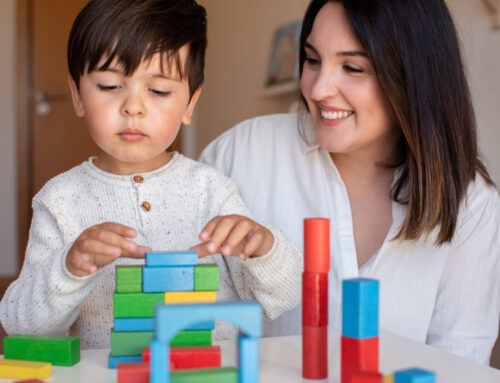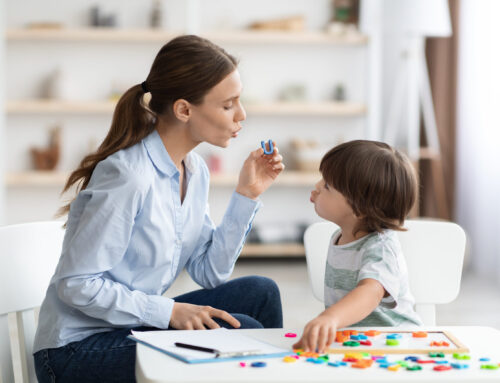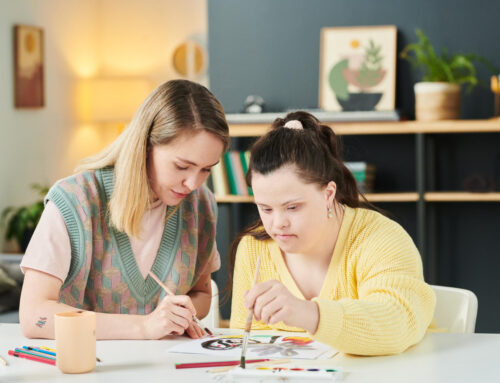
-
- Reciprocal conversation can come so easily to some children. They hear a command, a compliment, or just a simple question and can respond with ease and often with socially appropriate responses: “You want to play?” “Sure!” Starting at infancy, a little one has to start putting millions of pieces together with their brain at a phenomenal rate in order to develop, process, and communicate language. So, what happens when some of those pieces don’t quite align correctly?First things first: the types of auditory processing disorders that this article will be talking about has nothing to do with a child’s ability to hear. In fact, all of the inner ear structures for typical hearing would be intact, thus the source of the problem is harder to locate because it starts in the brain. The Hearing Health Foundation defines auditory processing disorder as the following:“Auditory Processing Disorder (APD), also called central auditory processing disorder (CAPD), happens when the brain is unable to process sounds. Individuals with APD have a neurological defect in the pathways from the auditory nerve through the higher auditory pathways in the brain” (2018).APD often accompanies learning disabilities and other developmental conditions such as Down syndrome, Attention Deficit Disorder (ADD), and autism. Disruptions to pathways in the brain lead to all sorts of problems for a child. For example, a typical child may have little issue with talking to another person in public surrounded by other people and other noises because their brain can filter out extra noise while the child can pinpoint what that one person is saying to them. Children with APD can have trouble focusing on one sound or one talking person in a noisy environment. Additional problems can include children having difficulty interpreting certain sounds into actual words, trouble with processing instructions one time through, and delayed responses to other people’s verbal communication.
APD can result in some behavioral outbursts and rightfully so. Having the inability to fully understand what other people are telling you is enormously frustrating. Furthermore, parents and other adults in a child’s life may feel irked because they might feel like the child is intentionally ignoring them or not paying attention.
Due to its increased public awareness, APD can be diagnosed early in order to get the child the right services Understanding Auditory Processing Disorders in Children. It usually requires a multi-disciplinary approach in which the child is assessed by multiple professionals at a very young age. Once a diagnosis is obtained, then clinicians and parents can move forward with helpful steps for the child.
One of the most difficult adjustments for a family is learning how to appropriately communicate with a child with APD in the home. Minor mishaps can lead to behavioral issues which severely decreases a child’s ability to participate in daily living tasks that are needed or enjoyable for them to perform (i.e. academics, playing with friends, feeding, dressing, toileting, showering, chores, sports, etc.). Parents can take proactive steps by consulting with professionals and applying learned communication techniques at home. Some of the following tips should be considered.
- Volume is not the issue: Remember, APD is not hearing loss. Speaking to your child in a louder voice will not improve communication; in some ways, increased volume might make your child think that you are losing patience or are getting angry with them.
- Pace your words: Actively think about how fast you are speaking and how many words per sentence you are communicating. Depending on the severity, your child may only be able to process a small handful of words at a time. Don’t be afraid of silence and pauses, and use them to your advantage. Carefully vocalize instructions slowly and intentionally, and wait for a response from the child before overloading them with more auditory information.
- Punishment may not work at all: Remember, if your child has APD then in many instances they are most likely not ignoring you on purpose. Make your diligent attempts to communicate with them slowly with direct eye contact. Wait for appropriate responses from your child before assuming that your child is misbehaving. Immediate punishment will not get anything done, will not improve communication, and will probably end badly for both the parent and the child.
- Acknowledge and limit additional noise: Consider all environmental noise: the T.V., music, other family members, the dishwasher, the dryer, passing cars, rain…just about any noise that a typical person can usually ignore during the day. All of the least obvious noises are going to be very disruptive for you child when they are trying to talk to you. Do your very best to limit those noises in order for your child to best communicate with you.
- Reciprocal conversation can come so easily to some children. They hear a command, a compliment, or just a simple question and can respond with ease and often with socially appropriate responses: “You want to play?” “Sure!” Starting at infancy, a little one has to start putting millions of pieces together with their brain at a phenomenal rate in order to develop, process, and communicate language. So, what happens when some of those pieces don’t quite align correctly?First things first: the types of auditory processing disorders that this article will be talking about has nothing to do with a child’s ability to hear. In fact, all of the inner ear structures for typical hearing would be intact, thus the source of the problem is harder to locate because it starts in the brain. The Hearing Health Foundation defines auditory processing disorder as the following:“Auditory Processing Disorder (APD), also called central auditory processing disorder (CAPD), happens when the brain is unable to process sounds. Individuals with APD have a neurological defect in the pathways from the auditory nerve through the higher auditory pathways in the brain” (2018).APD often accompanies learning disabilities and other developmental conditions such as Down syndrome, Attention Deficit Disorder (ADD), and autism. Disruptions to pathways in the brain lead to all sorts of problems for a child. For example, a typical child may have little issue with talking to another person in public surrounded by other people and other noises because their brain can filter out extra noise while the child can pinpoint what that one person is saying to them. Children with APD can have trouble focusing on one sound or one talking person in a noisy environment. Additional problems can include children having difficulty interpreting certain sounds into actual words, trouble with processing instructions one time through, and delayed responses to other people’s verbal communication.





